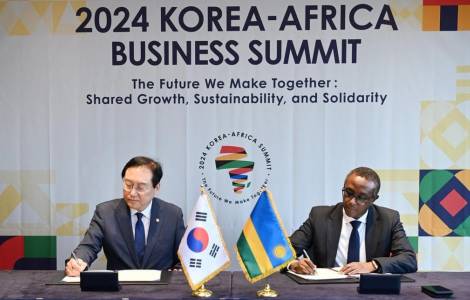
Seoul (Agenzia Fides) - "Shared growth, sustainability and solidarity". These are the three "pillars" of cooperation between African countries and South Korea, according to the joint statement issued at the end of the Africa-South Korea Summit, which ended in Seoul on June 5.
South Korea thus joins the ranks of various non-African countries (China, USA, France, Japan, Italy, United Kingdom, Turkey) or continental institutions (such as the European Union) that invite African heads of state and government to a joint summit.
Seoul's interest in Africa focuses on three themes: access to strategic raw materials; the creation of new markets for its products and political support in UN bodies; especially with regard to Pyongyang.
For their part, African countries see in this new "race for Africa" of the major and medium-sized powers an opportunity to break free from an old post-colonial logic (this applies to the former French colonies) and to be able to negotiate better conditions in exchange for their raw materials or their political and strategic support (for example, with regard to the transfer of military bases to non-African powers).
The Seoul summit was attended by 48 African countries (30 of which were represented by their Heads of State), as well as representatives of the African Union and the African Development Bank Group (AfDB).
South Korea has pledged to double its development aid to Africa to USD 10 billion by 2030 and to provide USD 14 billion in export financing to help Korean companies increase their trade and investment on the continent. Seoul also supports the initiative to create a single African market, as envisaged in the agreements establishing the African Continental Free Trade Area (AfCFTA). In this context, South Korea agrees to help create customs procedures to facilitate intra-African trade. The Korean government also intends to increase the role of domestic companies in the construction of "traditional" infrastructure (roads, railways, bridges, ports, airports, dams, seawater desalination plants, electricity and water management systems) and innovative infrastructure (the so-called "smart cities"), putting it in direct competition not only with China but also with a medium-sized power like Turkey.
According to Seoul, the digitization of the administrations of African states can take advantage of the programs already in place in South Korea. In addition, the Asian country is committed to "improving the digital skills of young people in Africa" through training and scholarships as part of the "Tech4Africa Initiative" program. These are soft power measures aimed at establishing links with future African leaders in politics and business in the medium to long term. In addition, South Korea is seeking to tap into a large and fast-growing market comprising 1.4 billion people, most of whom are under 25 years old, by supporting industrial infrastructure and digital transformation.
However, access to Africa's mineral resources, which are disputed by all world powers, is currently a priority. During the summit, the "Korea-Africa Critical Minerals Dialogue" was launched, which will serve as an important institutional foundation for strengthening Korea-Africa cooperation. "We have a shared vision of strengthening cooperation to ensure a stable supply of critical minerals and promoting technological cooperation on critical minerals on mutually agreed terms," said the joint statement, paving the way for cooperation that goes beyond mere mineral extraction to create a mineral processing chain in Africa for more advanced economies.
On the political side, Seoul's commitment to "contribute to peace and security in Africa, including through the improvement and expansion of cooperation projects in the fields of defense, defense industry and public security between Korea and Africa" cannot be underestimated. The reference to the defense industry is interesting considering that South Korea ranks tenth on the list of arms exporting states according to the latest SIPRI report (TRENDS IN INTERNATIONAL ARMS TRANSFERS, 2023).
Finally, Seoul has a geopolitical interest in maintaining its position in the UN bodies in a bloc of 54 states that holds three rotating seats in the UN Security Council. It is no coincidence that paragraph 21 of the joint statement states: "We reiterate our commitment to the full implementation of all UN Security Council resolutions and stress the importance of the international community's efforts to achieve a complete, verifiable and irreversible denuclearization of the Korean peninsula". (L.M.) (Agenzia Fides, 15/6/2024)